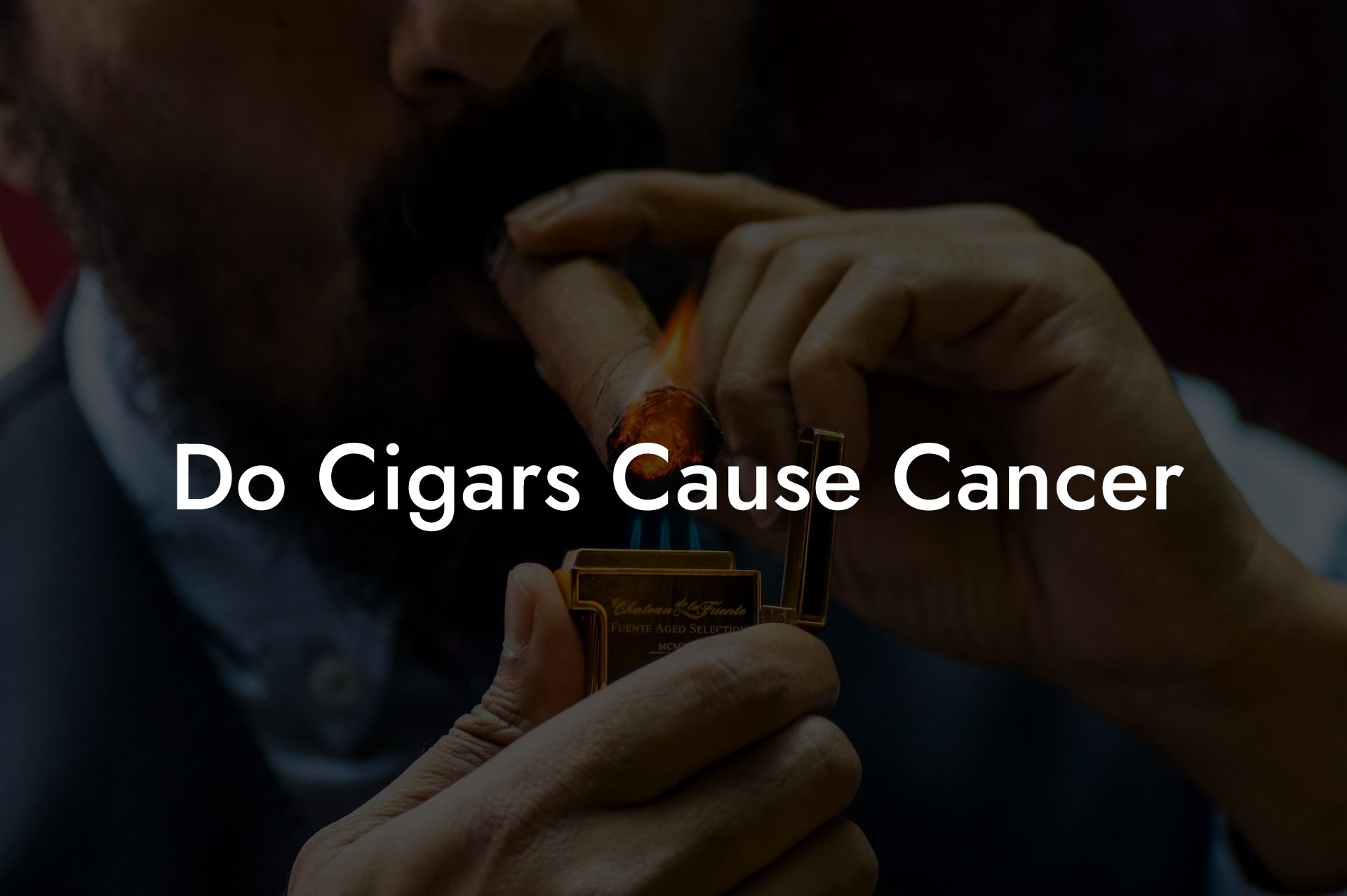Ever wondered if your occasional cigar indulgence is leading you straight into the cancer zone? Let’s cut through the smoky haze and dish out the real scoop on cigars, cancer, and everything in between in a way that vibes with your Gen-Z and millennial spirit. We're diving into the scientific nitty-gritty and debunking myths with a down-to-earth twist, no judgment here, just the facts and a bit of humor to keep you hooked.
Do Cigars Cause Cancer Table of Contents
The Cigar Conundrum: Smoking in a Modern World
Cigars vs. Cigarettes: What’s the Real Difference?
Understanding How Cancer Develops: The Science Behind the Scenes
Do Cigars Cause Cancer? What Does the Research Say?
Health Risks Beyond Cancer: The Wider Spectrum of Tobacco Exposure
Debunking Myths: The Truth About Cigar Smoking and Cancer
Modern Lifestyles and Smoking Culture: Context and Community
Harm Reduction and Alternatives: Lightening the Load
The Role of Personal Choice: Navigating Risks and Rewards
Resources and Community Support: Your Next Steps
Cultural Shifts and the Future of Tobacco Use
Charting a Well-Informed Path Forward
The Cigar Conundrum: Smoking in a Modern World
Cigars have been a cultural icon for centuries, a symbol of celebration, status, and a laid-back lifestyle. But in today’s world, where health consciousness is on the rise, the question “Do cigars cause cancer?” is more relevant than ever. With conflicting headlines floating around, it’s time to break down the science, the risks, and what it really means for your health.
From smoky lounges to casual backyard hangouts, cigars have always been associated with a relaxed vibe and a sense of camaraderie. However, as more studies and research dribble into the mainstream, the need to understand the risks associated with cigar smoking has never been more critical. So, let’s grab a seat, light up (figuratively speaking), and explore the complex world where pleasure meets risk.
Cigars vs. Cigarettes: What’s the Real Difference?
Before we get into the cancer debate, it’s essential to differentiate cigars from cigarettes because, believe it or not, they are not cut from the same cloth. Here are some key differences:
- Size and Composition: Cigars are typically larger than cigarettes and are made from whole-leaf tobacco, meaning they have a higher concentration of tobacco and, consequently, nicotine.
- Inhalation Practices: Many cigar smokers claim they don’t inhale the smoke deeply, which is a big point of differentiation from cigarette smoking. However, the carcinogens still interact with the mouth, throat, and even the lungs indirectly.
- Smoking Frequency: Cigar smoking is often an occasional indulgence rather than a habitual activity, but occasional doesn’t necessarily mean risk-free.
- Cultural Perceptions: Cigars evoke images of sophistication and celebration, whereas cigarettes are often seen as a daily addiction. This cultural nuance can sometimes blur the real health risks.
Knowing these nuances helps create a clearer picture when we answer the big question: Do cigars cause cancer? The differences impact the way toxic substances interact with your body, making this debate far more intricate than a simple yes or no.
Understanding How Cancer Develops: The Science Behind the Scenes
To truly understand whether cigars cause cancer, it helps to know a little about how cancer itself develops. Cancer is, in essence, a malfunctioning of the cells in your body. Normally, cells grow, divide, and eventually die in a neat, regulated manner. But when something goes wrong in that process, often due to genetic mutations triggered by toxins, the cells can become uncontrollable, leading to tumors.
The culprits behind these mutations are known as carcinogens, and they are many and varied. In the context of tobacco products, carcinogenic chemicals such as nitrosamines, polycyclic aromatic hydrocarbons (PAHs), and heavy metals like cadmium and lead are the main offenders. When these chemicals interact with your DNA, they can trigger mutations, setting the stage for cancer development.
It’s important to note that cancer is not a disease of immediate consequence, it often takes years, even decades, for the cellular mutations to develop into a full-blown illness. This latency period means that while the risks accumulate with exposure, the damage is not always immediately apparent.
Do Cigars Cause Cancer? What Does the Research Say?
Now, let’s cut through the smoke: do cigars cause cancer? The answer isn’t a simple binary because it depends on a variety of factors, the frequency of smoking, types of cigars, and individual genetic predispositions all come into play.
Many studies have shown that cigar smoking carries a significant risk for various types of cancer, including cancers of the mouth, throat, esophagus, and lungs. The risk level is generally higher for those who inhale deeply or smoke frequently. Even if you’re a casual cigar aficionado, repeated exposure to carcinogenic chemicals cannot be entirely ruled out when it comes to initiating cancerous processes.
It’s also worth noting that not all cigars are the same, some are manufactured differently, and the fermentation and curing processes of tobacco can alter the levels of harmful chemicals. The size and tobacco content play a significant role, with larger, hand-rolled cigars often containing more tobacco and, by extension, more carcinogens.
Moreover, scientific research continuously adapts with new findings, pointing to an association between frequent cigar smoking and increased cancer risk, regardless of inhalation practices. While some might argue that the less frequent cigar smoker is at lower risk compared to a daily cigarette smoker, the truth is that no level of tobacco smoke exposure is entirely risk-free.
Health Risks Beyond Cancer: The Wider Spectrum of Tobacco Exposure
Let’s not put all our chips on cancer alone. The toxic cocktail in cigar smoke comes with a host of other health consequences that might dampen your celebration vibe:
- Cardiovascular Disease: Tobacco smoke affects blood vessels and heart health. Even occasional exposure can lead to increased blood pressure and a higher risk of heart disease.
- Lung Diseases: Despite the common belief that you don’t need to inhale deeply, passive and secondhand smoke exposure can still contribute to lung disease over time.
- Dental Problems: Cigar smoking can lead to gum disease, tooth loss, and other oral health issues that are as painful as they are expensive to manage.
- Respiratory Complications: Chronic obstructive pulmonary disease (COPD) and other respiratory disorders can develop, significantly impacting quality of life.
- Overall Mortality Risk: The cumulative effect of these health issues can also lead to a higher overall risk of death, due to the compounding damage that tobacco exposure inflicts on multiple body systems.
The science is clear, while cigars might have a bit of a nostalgic, celebratory appeal, their impact on your body goes far beyond a fleeting indulgence. As you mix and mingle with friends at your next big event, remember that the ritual of cigar smoking comes with a significant price tag in terms of health.
Debunking Myths: The Truth About Cigar Smoking and Cancer
Let’s address some of the most persistent myths swirling around cigar smoking:
Myth #1: “Smoking a Cigar is Safer Than Smoking Cigarettes”
While it’s true that many cigar smokers do not inhale deeply, the consumption of tobacco still exposes the mouth, throat, and even the lungs to carcinogens. The safer perception is largely a myth, as the risk still presents itself albeit in different ways.
Myth #2: “Occasional Cigar Smoking Doesn’t Pose a Significant Risk”
Occasional use can still add up over time. Even if you reserve cigars for special celebrations, repeated exposure to carcinogens has cumulative effects that can lead to cancer or heart disease.
Myth #3: “There’s No Evidence Linking Cigars to Cancer”
A substantial body of research supports the association between cigar smoking and various cancers. Epidemiological studies and long-term clinical research have consistently highlighted the health risks.
Myth #4: “Natural or Organic Cigars Are a Safe Alternative”
Despite what the label might imply, “natural” or “organic” tobacco still produces harmful smoke. The organic tag does not eliminate the inherent risks associated with tobacco combustion.
By busting these myths, we reveal the unvarnished truth: cigar smoking, whether occasional or regular, involves significant health risks and can indeed contribute to the development of cancer.
Modern Lifestyles and Smoking Culture: Context and Community
While the health risks are undeniable, the cultural allure of cigars remains strong. For many, the act of smoking a cigar is more than just inhaling tobacco, it’s a social ritual, a mark of sophistication, or even an artistic expression.
In today’s world, where individual choices are celebrated and lifestyles are as diverse as your Spotify playlists, the decision to smoke a cigar is deeply personal. Social media influencers, lifestyle bloggers, and even niche communities on platforms like Reddit have sparked discussions about the “cool factor” of cigar smoking versus its health implications.
This cultural dynamic creates a perplexing scenario: how do you balance that undeniable allure with the scientific reality? The best approach is to stay informed, be mindful of your smoking habits, and weigh the occasional indulgence against long-term health outcomes.
Harm Reduction and Alternatives: Lightening the Load
If you’re someone who enjoys the vibe of a good cigar but is worried about the health risks, harm reduction strategies might offer a middle ground. Though the surest way to eliminate risk is to avoid tobacco products entirely, here are some approaches that can help reduce harm:
1. Moderation is Key
Limiting the frequency of cigar sessions can significantly lower your cumulative exposure to carcinogens. Think of it as treating cigar smoking like an occasional dessert rather than a daily meal.
2. Better Ventilation and Smoking Outdoors
Snuff that smoke outdoors where the air gets plenty of circulation. Well-ventilated environments prevent high concentrations of smoke from lingering around you and your crew.
3. Consider Alternatives
For those who love the ritual and taste of cigars, modern alternatives like nicotine pouches or vapor products might seem tempting. However, these alternatives come with their own sets of health risks and should be approached with caution.
4. Regular Health Screenings
If you’re in the habit of cigar smoking, regular check-ups and dental screenings can help catch any early signs of health complications. Staying on top of your health is always a smart move.
While harm reduction techniques don’t eliminate risk entirely, they can help mitigate the potential long-term damage of cigar smoking. After all, informed choices make for empowered lifestyles.
The Role of Personal Choice: Navigating Risks and Rewards
Life is all about balance, and choosing to indulge in a cigar is just one of those personal decisions that comes with its own set of trade-offs. Whether you’re lighting up a celebratory cigar after landing your dream job or savoring a quiet moment of reflection, it’s important to understand the risks and rewards.
The key is to make informed choices. By weighing the cultural, social, and personal benefits against the potential health risks, especially the increased risk of cancer, you’re better equipped to navigate your own path. Each puff might carry a legacy of tradition, but it also carries a charge that your body will have to bear over time.
Think of it like any other lifestyle choice: moderation, mindfulness, and a commitment to your overall health are your best allies. Knowledge is power, and in this case, it’s also your healthiest defense.
Resources and Community Support: Your Next Steps
Whether you’re a curious newcomer or a seasoned cigar enthusiast reconsidering your habits, resources and community support are available to help you make informed decisions. Here’s how you can take your next steps:
- Talk to Health Professionals: Consultation with healthcare providers or specialists in tobacco-related diseases can provide personalized insights into your risk factors and help you navigate the maze of options for reducing harm.
- Join Online Forums and Social Groups: Platforms such as Reddit, specialized Facebook groups, and cigar enthusiast forums can be a treasure trove of firsthand experiences, tips, and supportive discussions about balancing lifestyle choices with health.
- Access Reliable Scientific Resources: Follow trusted organizations like the American Cancer Society and the Centers for Disease Control and Prevention for up-to-date research findings, guidelines, and preventive strategies.
- Engage in Local Community Workshops: Some communities offer wellness workshops and cessation programs that not only address smoking-related risks but also provide strategies for reducing harm while maintaining a balanced lifestyle.
- Consider Behavioral and Mindfulness Techniques: Lifestyle changes, mindfulness practices, and stress reduction techniques can empower you to make healthier decisions, even if it means cutting back on that celebratory cigar every now and then.
The path to informed decision-making is paved with community, knowledge, and support. By tapping into these resources, you can enjoy your lifestyle choices while taking proactive steps to safeguard your long-term health.
Cultural Shifts and the Future of Tobacco Use
As society evolves, so do our relationships with products like cigars. Millennials and Gen-Zers, in particular, are at the forefront of this cultural shift, advocating for transparency, healthier alternatives, and a balanced view of tradition and modernity.
With increasing awareness around the health implications of tobacco, the future might see a move toward innovation and harm reduction. From smokeless alternatives to stricter regulations and better public education, the dialogue between pleasure and health is only getting more intense.
The conversation about cigar smoking and cancer is part of a broader dialogue about lifestyle, health, and informed decision-making. As you sift through the trends on Instagram and TikTok, remember that every lifestyle choice has its pros, cons, and a science-backed story behind it.
Charting a Well-Informed Path Forward
Ultimately, the choice to indulge in a cigar, like any other lifestyle habit, comes down to personal responsibility and informed decision-making. Understanding that there is no clear “safe” level of cigar smoking when it comes to cancer risk is crucial for anyone making claims of risk-free behavior.
The science tells us that whether you puff occasionally or immerse yourself in a rich tradition of cigar appreciation, there are measurable risks, especially when it comes to initiating cancer or other tobacco-related diseases. But knowledge is truly empowering. Armed with the facts, you can take deliberate steps to minimize harm, engage in healthy practices, and make choices that resonate with both your lifestyle and your long-term well-being.
Thinking critically, staying curious, and exploring alternative methods of celebration and relaxation can redefine what it means to enjoy life without sacrificing health. Your journey to a well-informed, balanced lifestyle begins with recognizing the risks and choosing to navigate them with mindfulness and care.
FAQs on Cigars and Cancer: Your Top Questions Answered
We’ve gathered some of the most frequently asked questions about cigars and cancer to help clear up any lingering concerns you might have.
1. Do cigars cause cancer?
Yes, studies consistently show that cigar smoking is associated with an increased risk of cancers, particularly those of the mouth, throat, esophagus, and lungs. The exposure to carcinogens present in tobacco smoke is the primary culprit.
2. Is cigar smoking less harmful than cigarette smoking?
While many cigar smokers claim that not inhaling makes them safer, the carcinogens in cigar smoke still affect the mouth, throat, and nearby tissues. The risk profile differs, but no form of tobacco consumption is entirely safe.
3. How does the frequency of smoking affect cancer risk?
The risk increases with the frequency and intensity of exposure. Even occasional cigar smoking contributes to cumulative exposure to carcinogens, thereby increasing the long-term risk of cancer.
4. Can switching to "natural" or "organic" cigars reduce my risk?
Unfortunately, even cigars marketed as "natural" or "organic" contain harmful tobacco compounds. The combustion process produces carcinogenic substances regardless of the label.
5. Are there any safe ways to enjoy cigars?
While moderation and harm reduction strategies (such as smoking outdoors, using proper ventilation, and limiting frequency) can help reduce risks, the only truly safe option is to avoid tobacco use altogether.
6. What other health risks are associated with cigar smoking?
Beyond cancer, cigar smoking can lead to cardiovascular disease, respiratory problems, dental issues, and overall reduced life expectancy due to prolonged exposure to toxic chemicals.
7. Is secondhand cigar smoke dangerous?
Yes, secondhand smoke from cigars carries many of the same health risks as firsthand smoke exposure since the harmful chemicals remain in the air and can affect those around you.
8. How can I minimize my risk if I choose to smoke cigars?
Minimizing risk involves moderation, opting for outdoor settings, and regular health check-ups. Awareness of the cumulative health effects can help you make more informed choices about your smoking habits.
9. Can social smoking really cause long-term damage?
Yes, even social or occasional smoking results in exposure to carcinogens. While the risk might be lower compared to heavy smokers, it is not negligible.
10. Is there any ongoing research on reducing the risks associated with cigar smoking?
Absolutely. Researchers continue to study the effects of tobacco smoke and to identify harm reduction strategies, including investigating safer tobacco alternatives and better public health interventions.
Your Journey to Making Informed Choices
Whether you’re a casual smoker who enjoys a celebratory cigar with friends or someone who’s reconsidering your smoking habits in light of new research, the key takeaway is empowerment through knowledge. Understanding the risks of cigar smoking, particularly the connection to cancer, allows you to make choices that align with your health goals and lifestyle.
As you move forward, remember that no decision is black and white. It’s about balancing the cultural and sensory pleasures of a fine cigar with the long-term implications for your well-being. Armed with the facts, you can design your lifestyle in a way that supports both your passions and your health.
Explore alternative celebrations, engage in regular health screenings, and stay connected with communities that prioritize holistic well-being. Your health is your most valuable asset, and every informed choice you make reinforces your commitment to a vibrant, fulfilling life.
So, as you ponder the age-old question “Do cigars cause cancer?”, remember that knowledge is your best defense. Embrace the journey of continuous learning, healthy living, and making empowered choices. Your future self will thank you.













